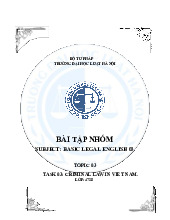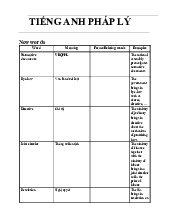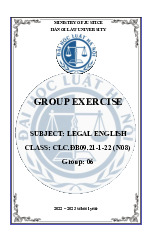









Preview text:
lOMoAR cPSD| 58412604 MINISTRY OF JUSTICE HANOI LAW UNIVERSITY GROUP ASSIGNMENT
SUBJECT: LEGAL ENGLISH
Topic: Choose a CISG case. Prepare a case analysis of 4-5 pages
which includes the following elements:
1 . What are the facts of the case? .
2 What are the legal issues? .
3 What are the plaintiff’s legal arguments?
4 . What are the defendant’s legal arguments?
5 . What are the findings by courts/arbitral tribunals?
6 . What are your comments on the outcome of the case?
Ha Noi – 2024 lOMoAR cPSD| 58412604 TABLE OF CONTENTS
INTRODUCTION ............................................................................................... 1
CASE ANALYSIS ............................................................................................... 1
I. Factual Aspects ................................................................................................ 1
1. Parties of the dispute ...................................................................................... 1
2. Nature of Proceedings .................................................................................... 1
3. Legal issues .................................................................................................... 2
4. Legislation ...................................................................................................... 2
II. Arguments of the Parties1. Did Glacier Bay's failure to meet the agreed
delivery timeline constituted a ............................................................................. 2
fundamental breach of contract? ........................................................................ 2
1.1. Plaintiff’s arguments ................................................................................... 2
1.2. Defendant’s arguments................................................................................ 3
2. Was Diversitel entitled to avoid the contract based on Glacier Bay’s breach
and to require the return of its payment? ........................................................... 4
2.1. Plaintiff’s arguments ................................................................................... 4
2.2. Defendant’s arguments................................................................................ 4
2.3. Court’s findings ........................................................................................... 5
II. Comments on the outcome of the case ......................................................... 5
CONCLUSION .................................................................................................... 6 lOMoAR cPSD| 58412604
TABLE OF ABBREVIATIONS Abbreviation Definition CISG
The United Nations Convention on Contracts for the International Sale of Goods RFQ Request for Quotation DND
Canadian Department of National Defence L/C Letter of Credit lOMoAR cPSD| 58412604 INTRODUCTION
The United Nations Convention on Contracts for the International Sale of Goods
(CISG) provides a standardized framework for resolving disputes in international business
transactions. Aimed at promoting fairness and uniformity in cross-border trade, the CISG
establishes clear guidelines on essential contract elements like delivery, payment, and breach,
fostering mutual understanding between parties from different legal backgrounds. In the case
of Diversitel Communications Inc. v. Glacier Bay Inc., the CISG’s principles come into focus
as the court evaluates a dispute over delayed delivery. This case explores whether there was a
failure to meet a critical delivery schedule constitutes a "fundamental breach" under the CISG,
allowing Diversitel to terminate the contract and recover its advance payment. The analysis
will cover the case's facts, legal issues, the arguments from each side, and the court’s findings,
providing insight into the CISG's role in navigating international contract disputes. CASE ANALYSIS I. Factual Aspects
1. Parties of the dispute
(1) Plaintiff: Diversitel Communications Inc. – a Canadian company that carries on business
in research and development of satellite and terrestrial communications.
(2) Defendant: Glacier Bay Inc – an American Company with its head office in Oakland, California.
(3) Court name: Ontario Superior Court of Justice (Canada)
2. Nature of Proceedings (1)
On August 19, 2002, Diversitel Communications Inc. issued a Request for Quotation
(RFQ) in Ottawa, seeking bids for vacuum panel insulation to meet strict timelines. The RFQ
highlighted that the order was linked to an ongoing contract with the Canadian Department of
National Defence (DND), specifically for installation in the Arctic, where the short summer
necessitated a limited delivery window. (2)
On August 26, 2002, Diversitel entered into a contract with Glacier Bay Inc., detailing
a specific delivery schedule. Diversitel paid Glacier Bay $40,000 USD upon issuing the
purchase order, expecting timely delivery as agreed. (3)
On October 4, 2002, Glacier Bay emailed Diversitel to inform them of a delay due to
issues with their principal supplier, admitting a breach of contract in terms of the delivery
schedule. Glacier Bay suggested an alternative supplier to mitigate the delay and inquired
whether Diversitel would consider this option. lOMoAR cPSD| 58412604 (4)
On November 1, 2002, Diversitel responded, stating that after reviewing the proposed
alternatives, they found them inadequate. Consequently, Diversitel terminated the contract and
sought the return of the $40,000 USD payment. In its defense, Glacier Bay argued that
Diversitel's termination was unwarranted and filed a counterclaim for breach of contract and for loss of profits. 3. Legal issues
(1) Did Glacier Bay's failure to meet the agreed delivery timeline constituted a fundamental breach of contract?
(2) Was Diversitel entitled to avoid the contract based on Glacier Bay’s breach and to
require the return of its payment? 4. Legislation
(1) United Nations Convention on Contracts for the International Sale of Goods (CISG) 1980
(2) International Sale of Goods Contracts Convention Act, SC 1991
(3) Ontario’s Rules of Civil Procedure, R.R.O. 1990, Reg. 194
(4) Sail Labrador Ltd. v. Challenge One (The), 1999 CanLII 708 (SCC)
II. Arguments of the Parties 1. Did Glacier Bay's failure to meet the agreed delivery
timeline constituted a
fundamental breach of contract? 1.1. Plaintiff’s arguments
Diversitel asserted that timely delivery was an essential condition of the contract, given
the Arctic installation constraints imposed by the Canadian Department of National Defence
(DND) project. On October 25, 2002, Diversitel e-mailed the defendant to emphasize that any
delay in delivery would frustrate the purpose of the contract, as installation had to be
completed during the limited Arctic summer. The timeline stipulated in the contract was
critical, as delays beyond this narrow window could defer the project by a full year.1
Diversitel argued that, pursuant to article 25 of the CISG, a failure to deliver what was
contracted for may constitute a fundamental breach of contract.20 Furthermore, Diversitel
argued that article 33 of the CISG provides that a seller must deliver by the date specified in the contract.2
The plaintiff correctly points out that the facts in Sail Labrador Ltd. v Challenge One
(The), supra, are clearly distinguishable from the ones in this case. In Sail Labrador v
Challenge One (The),supra, the Court concluded that the parties could not have
1 Diversitel Communications Inc. v. Glacier Bay Inc., 2003 CanLII 49351 (ON SC), para 10(XI). 2 Ibid, para. 27. lOMoAR cPSD| 58412604
intended that a single late payment among thirty-five payments made over a five-year term,
caused by no fault of the appellant could bring about a fundamental breach of contract to
charter a vessel, which the appellant had an option to purchase, subject to full performance of
its obligation in the Charter Party Agreement.2 1.2. Defendant’s arguments
Glacier Bay conceded the delay but argued it did not constitute a fundamental breach
of contract. They contended that the delay affected only initial shipments and was thus minor
and remediable. They argued that this did not discharge Diversitel from the contract.3
The defendant submitted that they had made reasonable efforts to rectify the delay by
proposing alternative suppliers. These proposals were intended to allow timely project
completion, and Glacier Bay argued that Diversitel’s rejection of these alternatives
demonstrated an unreasonable response, implying that the delay was not as critical as Diversitel claimed.
Glacier Bay questioned Diversitel’s decision to terminate on the grounds of timing
alone, suggesting that other, undisclosed motivations may have influenced Diversitel’s actions.
Glacier Bay contended that their performance could still have met the project’s needs despite the initial delays.
On the case Sail Labrador Ltd v Challenge One (The), the defendant relied on this case
as support for the proposition that generally speaking, time is of the essence in a contract only
where the parties have expressed it to be so by direct stipulation in the contract, or where the
circumstances require such a presumption. The defendant denies that either of these conditions
apply in the present circumstances.4 1.3. Court’s findings
From the outset, the plaintiff required the defendant to observe the delivery schedule in
good time so that the plaintiff could be assured to meet the terms of its own contract with
DND. The defendant has also admitted that no one would suggest that time was not important
to these parties. Therefore, the Court concluded that the parties did make time of the essence
by their communications and conduct leading up to the incorporation of the delivery schedule
as part of the purchase order.5 2 Ibid, para. 29. 3 Ibid, para. 11(V). 4 Ibid, para. 29. 5 Ibid, para. 32. lOMoAR cPSD| 58412604
2. Was Diversitel entitled to avoid the contract based on Glacier Bay’s breach and to require the return of its payment?
2.1. Plaintiff’s arguments
Diversitel argued that Glacier Bay’s inability to meet the agreed delivery timeline
constituted a fundamental breach, discharging them from further performance. Diversitel
maintained that Glacier Bay’s failure posed an unacceptable risk to
Diversitel’s contract with the DND, necessitating prompt action to mitigate potential damages
In its November 1, 2002 letter, Diversitel advised Glacier Bay that it had reviewed the
alternatives proposed by Glacier Bay but deemed them inadequate. Diversitel asserted that
continued reliance on Glacier Bay would compromise its project timelines and thus elected to
terminate the contract, demanding the return of the $40,000 advance payment.6
Diversitel refuted any implication that financial considerations or alternate supplier
costs influenced its termination decision. Diversitel asserted that it only engaged alternative
suppliers after Glacier Bay was in breach, solely to preserve its contractual obligations with the DND. 2.2. Defendant’s arguments
Glacier Bay argued that Diversitel’s termination was neither justified nor proportionate
to the delay, which Glacier Bay viewed as minor. They contended that Diversitel’s termination
was premature, particularly as Glacier Bay had provided reasonable proposals to mitigate the
delay. Glacier Bay maintained that these efforts demonstrated good faith in continuing the contract7.
Glacier Bay argued that they had incurred significant preparatory expenses— totaling
substantial design, equipment, and labor costs—which Diversitel was aware of, as evidenced
by the $40,000 advance payment arrangement 8 . Glacier Bay argued that Diversitel’s
unjustified termination resulted in financial loss and filed a counterclaim for damages.
Glacier Bay asserted that Diversitel’s confidence concerns were unfounded and
speculative, noting that Diversitel only engaged with Wacker Ceramics on October 25, 2002,
after informing Glacier Bay of its intention to terminate9. Glacier Bay implied that Diversitel’s
rationale for termination extended beyond timing, thereby challenging the purported grounds of termination. 6 Ibd, para. 10 (XI). 7 Ibd, para. 11 (VI)
8 Ibid, para 11, para. 11 (II) 9 Ibid, para. 11 (III) lOMoAR cPSD| 58412604 2.3. Court’s findings
Given the state of affairs, as expressed by the defendant on October 29, 2002, the Court
agreed with the plaintiff that it should not be required to “see how close it could get to the
guillotine” by relying upon the defendant and Nanopore in order to preserve
its own contract with DND. They were satisfied the plaintiff had been justified in having lost
confidence in the defendant. Therefore, the Court concluded that the plaintiff reasonably
terminated the contract on November 1, 2002.10
A judgment in the amount of $40,000.00 USD shall be awarded against the defendant
in favor of the plaintiff, along with interest before the judgment from August 26, 2002, and
post-judgment interest in accordance with the Courts of Justice Act. As a result, a decision will
also reject the defendant's counterclaim and demand for additional productions. II.
Comments on the outcome of the case
The concept of a "fundamental breach" is central to the right to avoid a contract. Article
25 establishes the principle of determining what constitutes a "fundamental breach" by
assessing the extent to which the breach deprives the other party of the benefits expected from
the contract. In practice, cases of contract avoidance under the CISG often relate to core
obligations in the contract, such as the seller's failure to deliver goods, the buyer's failure to
make payment, or the seller delivering goods that do not meet quality standards, etc. In the
case of Diversitel Communications Inc. v. Glacier Bay Inc., delivery had not yet occurred, so
there was no need to evaluate the quality of the goods; the matter focused on the defendant’s
violation of the delivery timeline.
Generally, a delay in delivery may constitute a fundamental breach if the contract specifies a
precise delivery date, and both parties understand that timely delivery is essential.
Furthermore, even if the contract clearly stipulates the delivery time and emphasizes this in
the terms, determining the existence of a "fundamental breach" requires more than assessing
whether the seller adhered to the deadline. It also involves examining whether the strict
timeline was necessary and meaningful for the buyer's intended purpose. In other words, if the
buyer receives the goods after the designated time, it is necessary to determine whether the
goods can still serve their intended purpose as initially contemplated in the contract.11
To expand on this perspective, the Fluorite Case12 assessed how the seller’s breach
impacted the buyer’s interests, especially in cases involving multiple breaches where some
actions affected the buyer’s decision to seek contract termination. In this case, the buyer 10 Ibid, para. 33.
11 Assoc. Prof. Nguyễn Bá Bình (2021), Hợp ồng mua bán hàng hoá quốc tế theo CISG: Quy ịnh và án lệ, NXB Tư pháp, p.335.
12 Chinese Seller v. German Buyer (Fluorite Case) (2006), China International Economic and Trade Arbitration Commission
(CIETAC): https://cisg-online.org/search-for-cases?caseId=7833 lOMoAR cPSD| 58412604
(Germany) negotiated a contract with the seller (China) to purchase fluoride. Inspections
revealed that the quality did not match contractual standards, and the parties could not reach
an agreement after negotiations. Additionally, the seller failed
to provide necessary documents before the letter of credit (L/C) expired. The seller then
submitted a claim to the arbitration commission requesting that the buyer be required to make
payment. However, the buyer argued that the seller’s failure to provide goods of the agreed
quality and deliver the documentation within the L/C timeframe constituted a fundamental
breach, thus entitling the buyer to terminate the contract and release it from the obligation to
pay. Upon review, the arbitrator observed that the primary issue centered on the quality of the
goods and the methods to bring quality in line with the contractual specifications rather than
the L/C timeframe. Moreover, if not for the quality issues, the buyer would have accepted the
goods without filing a claim. Consequently, the arbitrator determined that the quality breach,
not the missed documentation deadline, was decisive, but ruled for a price reduction instead of contract termination.
In summary, Article 25 requires that a breach must significantly impair the other party’s
anticipated benefits from the contract to be considered a "fundamental breach."
To avoid complexity and disputes in case of conflict, the expectations - or more specifically,
the purpose of the goods under the contract - should be clarified from the outset to establish
mutual understanding between the parties. CONCLUSION
In conclusion, the case of Diversitel Communications Inc. v. Glacier Bay Inc.
provides a compelling example of how the CISG addresses the importance of adhering to strict
delivery timelines, particularly when such timelines are fundamental to the contract's purpose.
The court found that Glacier Bay’s delay constituted a fundamental breach, depriving
Diversitel of essential contractual benefits, especially given its obligations with the Canadian
Department of National Defence. This analysis underscores the significance of clearly defined
terms and expectations in international contracts, as well as the value of the CISG’s framework
in resolving such disputes. Through this case, we see the CISG’s Article 25 in action,
emphasizing that a breach must substantially impair the other party's anticipated benefits to
qualify as “fundamental.” The outcome not only affirms Diversitel's right to terminate the
contract but also highlights the importance of mutual understanding in contract formation to
prevent similar conflicts. lOMoAR cPSD| 58412604 REFERENCES
1. Hanoi Law University (2017), Textbook on international trade and business law,
Youth Publishing House Hanoi.
2. UNCITRAL (2016), Digest of Case Law on the United Nations Convention on the
International Sale of Goods.
3. Diversitel Communications Inc. v. Glacier Bay Inc., 2003 CanLII 49351 (ON SC),
link: https://www.uncitral.org/docs/clout/CAN/CAN_260404_FT.pdf
4. Chinese Seller v. German Buyer (Fluorite Case), China International Economic and
Trade Arbitration Commission (CIETAC), link: https://cisgonline.org/search-for- cases?caseId=7833
5. Assoc. Prof. Nguyễn Bá Bình (2021), Hợp ồng mua bán hàng hoá quốc tế theo CISG:
Quy ịnh và án lệ, Judiciai Publishing House.




